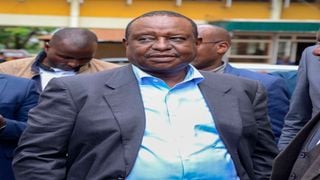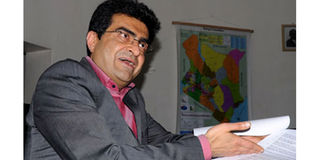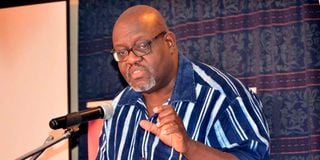
Former Finance Cabinet Secretary Henry Rotich at a Milimani Court in Nairobi on Thursday, December 14, 2023 when he was acquitted in the Sh63 Billion Arror-Kimwarer dam scandal.
| Dennis Onsongo | Nation Media GroupNews
Premium
Court cases to nowhere: Shame of big scandals, but no convictions
What you need to know:
- Ex-Treasury CS Rotich was acquitted in the dramatic Sh63 billion Arror and Kimwarer dams case.
- Investigative agencies, courts and public prosecutors trade blame whenever high-profile cases collapse.
Attempts by Kenya’s justice system to find and convict high-profile corruption suspects have more often than not been like a dog chasing its own tail, a scenario that once again played out on Thursday when former National Treasury Cabinet Secretary Henry Rotich was acquitted in the dramatic Sh63 billion Arror and Kimwarer dams scandal case.
The three justice system players —investigative agencies, courts and public prosecutors — have in the past traded blame over who is responsible for letting the big fish go.
The blame game played out again on Thursday when Mr Rotich was acquitted, as the magistrate accused prosecutors of mishandling the case.
Mr Rotich, who has all through maintained innocence, was acquitted alongside eight others — Kennedy Nyakundi Nyachiro, Jackson Njau Kinyanjui, David Kipchumba Kimosop, William Kipkemboi Maina, Paul Kipkoech Serem, Francis Chepkonga Kipkech, Titus Murithi and Geoffrey Mwangi Wahungu.
In freeing them, Nairobi Magistrate Eunice Nyutu bashed the Office of the Director of Public Prosecutions (ODPP) for its laissez faire attitude towards the case, by failing to question 41 witnesses who were lined up to testify against the nine accused persons.
Ms Nyutu’s criticism of the ODPP leaves an open question on whether the four-year trial may have yielded a different result, if the ODPP had taken a different approach.
The Arror and Kimwarer dams projects exposed taxpayers to a loss of nearly Sh30 billion. The dams were to cost Sh63 billion, but the contractor, Italy’s CMC Di Ravenna, went bankrupt before completing construction.
Kenya received Sh16.2 billion in foreign loans for the now white elephant projects, and CMC Di Ravenna has now sued the government for Sh12 billion compensation at the International Chamber of Commerce.
The latest acquittals have once again put sharp focus on Kenya’s justice system, as high-profile scandals that defined various administrations since independence remain unresolved with one common denominator — taxpayers who have lost billions in stalled or dead projects.
Some of the scandals that have welcomed the country’s Very Important People and their regular accomplices include Goldenberg during President Daniel Moi’s reign, Anglo Leasing and the cemetery land purchase scandal in President Mwai Kibaki’s term, two National Youth Service heists, a raid on the Ministry of Health coffers and the dams saga in President Uhuru Kenyatta’s term.
Over the years, some of the who-is-who in Kenya, have sat on the dry, wooden benches in Kenya’s courts but all those cases have collapsed with no culprit — even the less known — being convicted.
President William Ruto, Prime Cabinet Secretary Musalia Mudavadi, former Cabinet Secretaries Chris Obure, David Mwiraria and Henry Rotich, former Principal Secretaries Wilfred Karuga Koinange, James Mbui Magari, David Onyonka, Dave Mwangi and Sammy Kyungu are some of the top public officials and politicians that had their turn in the dock.
Wealthy businessmen Kamlesh Pattni, Rashmi and Deepak Kamani, David Onyonka, Dave Mwangi, Ben Gethi, among several others, have also been in the dock.

Kamlesh Pattni, the man behind the infamous Goldenberg scandal. At the age of 25, he he pulled off one of Kenya’s biggest thefts of the public coffers. PHOTO/FILE.
Yet no culprit was found guilty in any of the cases they were charged in. The Kamanis are, however, awaiting judgment in the last of the Anglo Leasing cases.
In 1993 Mr Pattni was charged with conspiracy to defraud the government of Kenya, after it emerged that his company, Goldenberg International, co-owned by former spy chief James Kanyottu, received billions of shiilings in a bogus subsidy scheme for gold exports.
In a bid to revive gold mining, the government gave subsidies to companies exporting the precious metal.
Goldenberg International topped a list of firms that would smuggle gold into Kenya from Zaire (now the Democratic Republic of Congo), export it as though it was mined locally, and benefit from the government subsidy programme as well.
Taxpayers are estimated to have lost more than Sh100 billion, but the actual amount will probably never be known with some accounts giving a figure of up to Sh158 billion that was transacted between 487 companies and individuals. The amount lost was at the time approximately 10 per cent of Kenya’s GDP and the effects were felt decades later.
Mr Pattni was in 2013 acquitted of all charges. Justice Joseph Mutava blocked further prosecution of the controversial businessman.
Between 2008 and 2013, Mr Pattni also struck a deal to relinquish ill-gotten assets such as the Grand Regency Hotel (now Laico Regency) and duty free shops which had also attracted the threat of prosecution.
Justice Joseph Mutava’s handling of the Pattni cases claimed his job, as the Judicial Service Commission and the Supreme Court upheld decisions to boot him from the Judiciary.
Before the dust could settle on the Goldenberg scandal, Mr Moi’s administration got into a deal to revamp several security agencies by purchasing ultra-modern equipment and setting up new labs and other facilities.
Companies associated with businessmen Deepak and Rashmi Kamani, led by Anglo Leasing Finance Ltd were awarded multibillion-shilling contracts.
Barely anything was delivered, with the contract duration sliding into the early years of President Kibaki.
In February, 2005 John Githongo, then Kenya’s anti-corruption tsar, resigned from his job after serving for two years.
After resigning, he blew the whistle on the Anglo Leasing scandal, alleging that then Vice-President Moody Awoori, ministers Kiraitu Murungi, David Mwiraria and Chris Murungaru had aided theft through the Anglo Leasing companies.

Former permanent secretary and anti-corruption crusader, John Githongo.
Mr Mwiraria was charged but never set his foot in court until his demise at Karen Hospital to answer charges of abuse of office when he served under Mr Kibaki.
The first attempt to prosecute Anglo Leasing Finance in 2005 died a natural death after the courts ruled that there was no evidence.
In 2015 Mr Mwiraria was charged alongside Mr Magari, Mr Mwangi, Mr Onyonka, the Kamanis and Infotalent Ltd with conspiracy to defraud the government of Sh9.5 billion. They were all acquitted in July, 2023.
They were also charged in a separate case of conspiracy to defraud the government of Sh3.5 billion. The case is pending judgment.
In 2019, Dr Murungaru won a defamation case against Dr Githongo who was ordered to pay Sh27 million in damages.
To date, only former Home Affairs PS Sylvester Mwaliko has been convicted in relation to the Anglo Leasing scandal. In 2012, he was found guilty of facilitating the heist, and ordered to pay a Sh3 million fine or serve three years in jail.
Two years after President Uhuru Kenyatta succeeded Mr Kibaki at State House, it emerged that close to Sh1.8 billion had been looted from the National Youth Service (NYS) through fraudulent payments to firms that did not supply the agency.
Then NYS Director-General Nelson Githinji and former Devolution PS Peter Mangiti were charged alongside businessman Ben Gethi and other individuals accused of pocketing the funds.
In October 2023, Chief Magistrate Wendy Micheni acquitted them after ruling that prosecutors did not furnish enough evidence to sustain a conviction.
Ms Micheni held that a conviction would have been gained if prosecutors had submitted electronic evidence of the irregular payments. Just like that, taxpayers had taken a Sh791 million bath in that case. Other related cases pushing the loss to Sh1.8 billion are still pending determination.
In May 2018, reports emerged that the NYS had been hit again and in similar procurement fraud fashion, this time netting close to Sh9 billion.
Former PS Lillian Omollo was charged alongside several businessmen and NYS employees with authorising irregular payment of Sh851 million to firms that did not supply the agency.
Ms Omollo was acquitted in July 2023, after the ODPP withdrew charges against her.
Phylis Njeri Ngirita, Lucy Wambui Ngirita and Jeremiah Gichina Ngirita — the key faces from the private sector in the second NYS heist — have since been ordered by the courts to forfeit assets worth over Sh400 million to the State.
Other cases related to the scandal are still ongoing.
In some instances, after revelation of theft, the Executive and investigative agencies spit venom as they vowed to get convictions and end corruption.
After the Business Daily revealed the theft of over Sh5 billion from the Ministry of Health in 2015, President Kenyatta vowed to have culprits jailed. Nobody was ever charged.
Interestingly, the irregular contracts roped in Mr Kenyatta’s sister Nyokabi Kenyatta Muthama and cousin Kathleen Kihanya. Their Sundales International bagged supplies contracts with the Kenya Medical Supplies Agency and was among companies flagged in an internal Health ministry audit.
President William Ruto, then serving as Mr Kenyatta’s deputy, defended Ms Nyokabi and Ms Kihanya, arguing that they should not be targeted on account of being members of the first family.
In 2020, Kemsa mishandled Sh7.7 billion intended for personal protective equipment as Kenya struggled to contain the Covid-19 virus.
President Kenyatta gave investigative agencies 21 days to arraign suspects in court. Nobody has been charged to date.






